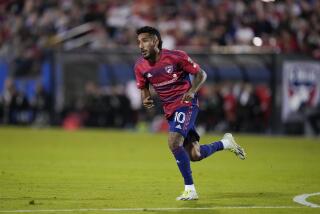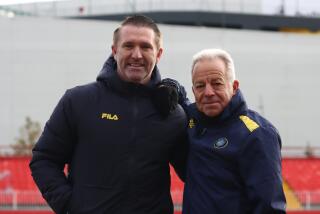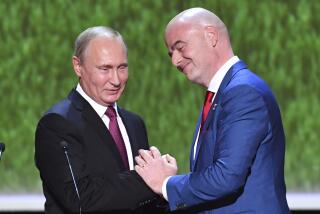COMMENTARY : Eastern Bloc Sports Take a Back Seat in the Game of Politics
- Share via
There is a new newspaper in Czechoslovakia, started up since the revolution. The name of the publication roughly translates to “The National.” It is not a sports daily.
Yet sports, as much as any aspect of life in Eastern Bloc nations, had its shutters rattled and its windows smashed by last winter’s anti-Communist storms. For four decades, in the Real Big East, sports had been a lot like it is in that basketball conference we always hear so much about: Sports first. Win first. Publicity first. All at the expense of the non-elite, the NCAA Division IIs and Division IIIs; the intramurals.
It is ironic that, as democracy struggles to the fore in the Real Big East, thereby lowering the priority of sports in the eyes of the new governments, International Olympic Committee President Juan Antonio Samaranch is campaigning to retain the old order.
Samaranch, in an extraordinary meeting with Olympic chiefs from the dissolving East Bloc nations last month, pleaded with those officials to sustain their elite sports programs. He even brought along the IOC’s western marketing team, which includes U.S. Olympic Committee Marketing Director John Krimsky, and hinted at direct funding from the IOC.
Of course, Samaranch is protecting his own turf. As the Olympics thrived on the Cold War, on the “war without bullets” of the Real Big East arguing its system’s righteousness through sports victories over the West, so too would the Olympics suffer if some of its strongest teams suffered. And they are suffering in the Real Big East.
East Germany, not knowing where its next mark is coming from, is dismantling a government-fed sports colossus that had put that nation of 16 million people on an Olympic par with the superpowers, the United States and Soviet Union. Only a handful of East German sports, suddenly without state money, have ties to life-sustaining corporations, such as track and field.
But even those sports will have lost their biggest selling point in the West: They no longer will be the mysterious Blueshirts; they will just wear club uniforms like everyone else. Who will want to pay to see that?
The Berlin Wall springs leaks and you literally walk through a ragged new hole to the other side and pass through East Germany and Hungary and Romania and Czechoslovakia and you learn it is not so different from home, in a lot of ways. It is old Europe--cobblestones and public squares filled with statues and electric street cars and tiny automobiles that sound like popcorn poppers when they idle. It is neglected Europe--choking pollution from dusty brown coal fuel, a scarcity of fresh vegetables and fruit.
Any day now, with government censorship gone the way of the Communist governments themselves, there could be a sports talk radio station in Czechoslovakia. This is possible: “Hey, Mad Dog, this is Jan from Bratislava; first-time caller. Love your show, man. Hey, I wanna talk about Coach Pala’s stupid decision to play Sjerber in the Davis Cup doubles against the United States when Sjerber was hurting. . . .”
For those who can pick up the signal of the new Eurosport network--the ESPN across the ocean--Bob McAdoo is shooting jumpers. He plays in the Spanish league. The Bo Jackson Nike ads on Eurosport are the same except for the addition of a soccer player and a cricket player.
Of course, there are differences on the other side, most of them the residue of the suddenly out-of-fashion Communist ideology
Sigfried Koenig, a fairly high-ranking sports official at East Berlin’s Turn-und Sportclub Berlin, suggested that sports would have to take a back seat in the new government vehicle because “people don’t know how they even will pay for their flat now.” In East Germany, where almost $200 million a year was budgeted for elite sports by the old Communist government (a 25% slice of the state pie); where there was a nationwide system of scouting prospective athletes and placing them in various sports schools and clubs; where there was coordinated training of coaches along with networking of scientific and medical research, sports are now on their own. Koenig’s new job is in “marketing,” something Eastern Bloc nations never did before.
“We are looking for sponsors,” he said. “We are in urgent need of promotion. If you know someone in the U.S.A. interested in East German sports. . . . “
In Romania, the best first-division soccer teams, Dinamo and Steuau, have contracts with Ford and with an Italian firm, San Plast, but after that, there is a scramble to undo what Nicolae Ceausescu did all those years. Longtime Romanian Olympic official Alexandru Siperco said Ceausescu, unlike other Eastern Bloc rulers, “hated” sports. Soccer fields routinely were ripped out and used for planting--and the crops exported to put more money in Ceausescu’s full pockets. Seventeen brand-new tennis courts were bulldozed in a fit of anger by Ceausescu in August; he simply didn’t like looking at them.
In Czechoslovakia, there are some of the most marketable sports in Eastern Europe--ice hockey, tennis and soccer--but attendance has been on the decline in recent years. Plus, no one is trained in marketing in Czechoslovakia. Furthermore, the new autonomy in sports has created a chaos of athletes, coaches and agents at war with each other for control.
Hungarians will tell you now--elite sports has long since found the cheaper outlets: in fencing, soccer and water polo.
More to Read
Go beyond the scoreboard
Get the latest on L.A.'s teams in the daily Sports Report newsletter.
You may occasionally receive promotional content from the Los Angeles Times.






